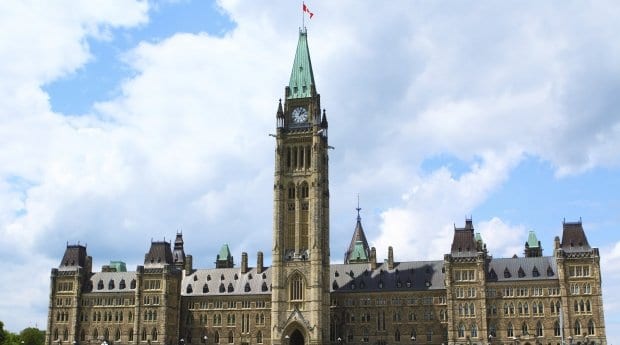A group of academics, activists and politicians is pressing the federal government to formally apologize for a secretive campaign to identify and remove gay and lesbian members of the military. The campaign ran from the 1950s to the early 1990s.
NDP members of Parliament Craig Scott and Randall Garrison joined professor Gary Kinsman and Darl Wood — who herself was purged from the Canadian Forces in the 1970s for being a lesbian — to call for the Conservative government to address what they call a “blight” on Canada’s military history, during a press conference on Parliament Hill on May 2.
Scott acknowledges that the NDP motion, brought forward a year prior calling for an apology, an investigation into the dismissal of LGBT members and an amendment to the official records of those purged to reflect honourable service, will not be heard before the House adjourns for the next federal election this fall.
Still, Garrison says the government could simply move forward on it, as well as several other NDP proposals regarding sexual discrimination, without direction from the legislature.
“There’s nothing to stop the government and the appropriate ministers from acting at this time,” says the openly gay MP for Esquimalt—Juan de Fuca on southern Vancouver Island.
The motion is being supported by the We Demand an Apology network, a recently formed group composed of some of those who were removed from their positions during the LGBT purge, as well as supporters and researchers, including Kinsman.
Researchers suspect that hundreds — if not thousands — of members were booted out because of their sexual orientation during the decades-long campaign.
The impact of being purged, however, extended beyond simply losing one’s job, Wood says.
After an intrusive probe into her personal life conducted by government agents which led to her dismissal from a military position in Halifax, Wood says she also lost her home, lover and family.
“Being victimized was the worst. They isolated me, they abused me . . . they left me with no resources,” Wood explains. She says that while retelling the story of her ordeal hasn’t gotten any easier over the years, it is necessary to “recognize and remember not only how far we’ve come as an oppressed group but also the journey” to get there.
She says she was only on the job for three years when she was first accused of being lesbian and was forced to endure hours of intense grilling by two investigators about her personal life.
“They wanted to know how, who, when, where and what we did in the privacy of our home and bedroom,” Woods says.
The campaign to expose and remove LGBT personnel from positions where they would have access to sensitive or classified information was justified at the time on the grounds of national security.
Gays and lesbians, it was thought, suffered from a character weakness that made them especially vulnerable to potential blackmail schemes from enemy agents.
The purge, though, extended beyond the military to the Royal Canadian Mounted Police, to the Canadian Security Intelligence Service and to various departments and agencies within the civil service, including some with no relation to national security, says Kinsman, a Laurentian University professor and the co-author of the book The Canadian War on Queers: National Security as Sexual Regulation.
Although justified on the grounds that gays and lesbians working in top-security positions could be blackmailed by sinister groups or foreign governments, Kinsman says that LGBT military members were only ever harassed and intimidated by their own government.
“People were watched, followed, interrogated and purged from their jobs,” Kinsman says. “Research indicates that the campaign against homosexuals also resulted in people taking their own lives.”
Asked what impact an official apology would have, Kinsman says it would be the government’s “first indication of a recognition of responsibility for this wrongdoing.”
“At the same time as the Canadian government claims to be a firm supporter of LGBT rights on a world scale, it has still not come to terms with the anti-LGBT security purge campaign in Canada that it was directly responsible for,” Kinsman adds.
The federal Liberals say they will support the motion if it comes to a vote, with MP Hedy Fry reiterating the party’s historic support for the LGBT community.
In a statement to Daily Xtra, a Defence Department spokesperson says it would be inappropriate to comment on the motion because it is before Parliament.
Scott’s motion is one of several brought forward by NDP MPs on issues regarding sexual discrimination by the government, including one asking for an apology to civil servants who were fired because of their sexual orientation and another to expunge the records of those convicted of offences no longer in the Criminal Code, such as homosexual sex.


 Why you can trust Xtra
Why you can trust Xtra


